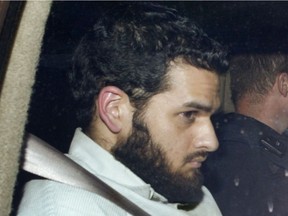From Terrorist To Aspiring Social Worker
"Taking responsibility for building electric devices or funding and training terrorist organizations to advance their interests without a fulsome appreciation of how your role contributed to and facilitated the larger objectives of the terrorist organization is problematic."Parole Board of Canada appeals division"[The September 11 plane hijackers were] effective and honourable [economic jihadists whose actions, if repeated, could bring down the United States which is at war with Islam].""Yes, I understand that human beings died, but there is absolutely no other way of achieving the same objective with the same effect."Momin Khawaja, convicted terrorist
 |
Behind be\ars for 18 years, 43-year-old Khawaja has had his request for parole denied. The parole board's rejection of his application in February for day parole has been upheld by the board's appeal division. Khawaja had been arrested and charged in 2004 with seven terrorism-related offences. Of the seven he was convicted on five counts. Justice Douglas Rutherford felt not enough evidence to prove he knew his detonator would be used against civilians had been presented at trial, leading him to convict the man on five of the seven charges.
He was then sentenced to ten and a half years in prison. That became 18 years when the Court of Appeal ruled the penalty meted out did not reflect the severity of Khawaja's crimes. The sentence "failed to reflect the enormity of the accused's crimes", commented the Court of Appeal, replacing the 10-1/2 years with a 24-year prison sentence; essentially life imprisonment.
He had associated himself with an al-Qaida-inspired plot along with five British men to bomb targets in the United Kingdom. Those five British men received life sentences in their own involvement with the same fertilizer bomb plot. Canada's Anti-terrorism Act came into effect months following the 9/11 attacks on New York and Washington, and Khawaja was the first Canadian to be convicted and sentenced under the provisions of that Act.
Khawaja's involvement as an IT specialist with the international terrorist plot was to build a bomb detonator for the British terror cell. A November 2021 risk assessment of the prisoner prepared by the Correctional Service of Canada was taken into consideration in rejecting Khawaja's application for early parole. The assessment was based on Khawaja informing a psychologist that no one had been harmed, physically or psychologically when he worked on the detonator.
It seemed obvious enough to them that Khawaja failed to own responsibility for advancing the interests of terrorist groups. When the parole board initially denied Khawaja day parole, it was felt that he represented an "undue risk to society". In his appeal, Khawaja argued the board failed to consider his changed values and beliefs during incarceration. Two imams had helped him move away from extremism "toward a more democratic, moral and Canadian view of society".
His hope was that he would be permitted to move to an Ottawa halfway house. That his future lay in studying law and ultimately to a career where he planned to help refugees. According to the appeal division panel, Khawaja had failed to provide specifics relating to his changed attitudes and nor did he put together a viable, structured release plan.
He had been employed on contract to Canada's foreign affairs department, working as a software developer. When he went to trial in June of 2008 he pleaded not guilty to the seven offences under the Criminal Code's newly passed terrorism section to be charged post-9/11 for terrorism. It was Khawaja's own massive store of emails that revealed how involved he was as a committed Islamic Jihadist who idolized Osama bin Laden and the masterminds of the 9/11 attacks.
At trial, federal prosecutors charged him with aiding and abetting the foiled British bomb plot, funnelling funds to the group, and building a radio-frequency device they named the "Hi-Fi Digimonster", to enable the detonation of bombs remotely.
Labels: Canada, Convicted al Qaeda Terrorist, Momin Khawaja, Parole Appeal Rejected

<< Home